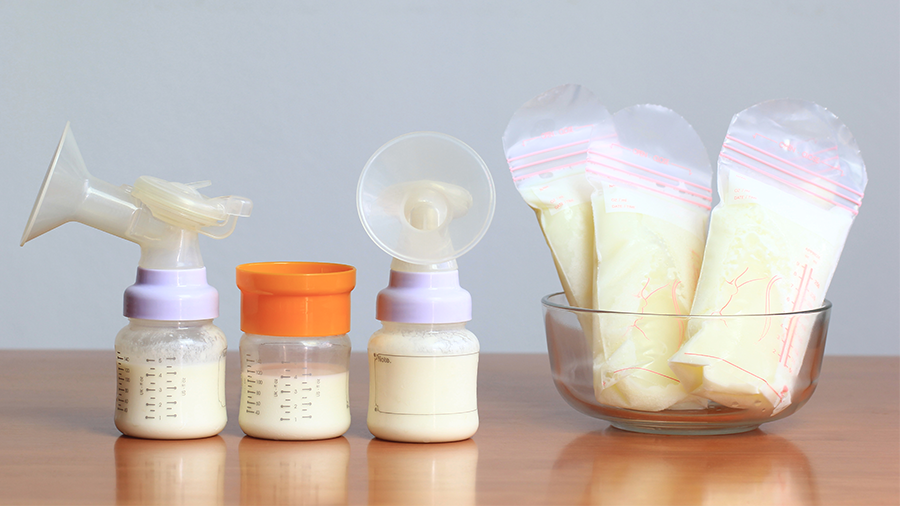An ancient practice that is in need of modern-day support
Breast milk provides a child with complete nutrition and protects it from infections and sudden infant death syndrome. Breast milk is dynamic in composition: The hormones, immune factors, and nourishing elements adapt over time and even throughout the day to fulfill the growing child’s needs.
The World Health Organization recommends that new mothers exclusively breastfeed for the first six months of a child’s life and then continue to breastfeed while introducing other foods for two more years.
The global breastfeeding initiative by UNICEF underscores the significance of breastfeeding this way: “Breast milk acts as a baby’s first vaccine, stimulates brain development, and protects a woman’s health. When mothers breastfeed, everyone benefits. It offers children unparalleled health and brain-building benefits. It has the power to save the lives of women and children throughout the world, and the power to help national economies grow through lower health care costs and smarter workforces.”
Despite all the known benefits of nursing, women who breastfeed are not given the support they need, and the consequences sometimes are devastating.

Quite an investment
Many people wrongly think that breastfeeding just comes naturally and is free. A new mother may struggle with lactation right away, and breastfeeding requires substantial financial, time, emotional and physical investments.
A new mother spends a great deal of time nursing — attached to an infant or pumping — to develop and maintain milk supply. She must try to perfect latching, heal sore nipples, deal with breast pain, and learn different feeding positions all while physically and emotionally recovering from childbirth. It’s no wonder new moms are exhausted, anxious and overwhelmed.
Plus, new moms need pumps, bottles and related supplies, lactation consultant services, nursing pillows and creams, which often are not covered by insurance. Lack of financial and lactation resources often makes nursing difficult.
Mixed messages
Inge Schotanus is a schoolteacher in the Netherlands who struggled with breastfeeding her child.
“My son was not drinking enough breast milk. The nurse was hammering so much on how good it was for my son to breastfeed. I felt a lot of pressure. I was recovering from childbirth and dealing with a lot of emotions, plus the pressure and the knowledge that my son was not getting enough milk confused me a lot,” she said.
At the same time, she received conflicting advice from her mother, who encouraged her to use formula.
“I was in between those two ladies. I had no clue and a crying baby that did not sleep well because it was hungry,” she said. “Luckily, the midwife came on a house call, which is a practice in the Netherlands, and said I could use formula and try to breastfeed at the same time and that all other information about bottle confusion was utter nonsense. Just do what feels right. This woman was my lifeline.”
Many mothers successfully combination feed — a practice that involves giving babies formula in addition to breast milk.
Negative experiences
Early support from family, lactation consultants, and a medical care team plays an important role in shaping a mother’s nursing journey.
Studies suggest that early negative breastfeeding experiences may increase the risk of postpartum depression. Women who face nursing challenges and low self-efficacy report more symptoms of depression.
The World Alliance for Breastfeeding Action reports that up to 80% of new moms — whether they nurse or not — experience mild mood disturbances, and one-fifth of new moms develop postpartum depression.
When Savita Patil learned that she had become a grandmother last year, she was thrilled.
“I was ecstatic. My daughter that given birth to her first child after 10 years of marriage and infertility struggles,” said Patil, who lives in a small town in Maharashtra, India.
But that joy soon waned. The new mother developed medical issues that prevented her from breastfeeding. She was eventually diagnosed with post-partum depression, Patil said, and the family tried to support her.
“I think her struggle with infertility and then her anxiety due to breastfeeding issues contributed to her depression,” Patil said. “She took this to her heart and was never able to recover back from a black hole of self-blaming.”
Patil’s daughter died by suicide. It was “a loss we will never recover from,” Patil said.
Mary Tayal, a clinical psychologist at Thriveworks in North Carolina, said that it’s common for women to “experience anxiety, depression or intrusive thoughts after childbirth.”
For some, Tayal said, breastfeeding is indeed a stressor. “Most women are concerned that their baby is not getting enough nourishment via breastfeeding,” she said. And while some abandon the effort for formula, some “mothers who continued to breastfeed were unprepared for the difficulty of breastfeeding and voiced feeling the difficulty was somehow their fault.”
Tayal said mothers cite a lack of support from their partners, family members and medical providers, including pediatricians.
Of course, it is important to differentiate between symptoms arising from the physical act of breastfeeding and those arising from health complications and cultural and situational associations.
A lot of women face physical challenges, such as latching problems, oversupply or undersupply of milk, breast engorgement, clogged ducts and mastitis. Infections in particular make breastfeeding painful. All of these physical symptoms can result in low mood and feelings of failure, inadequacy and unhappiness.
Balancing act
According to the Centers for Disease Control and Prevention, one-third of breastfeeding mothers in the United States supplement with formula by the time the baby reaches six months of age. Combination feeding helps sustain breastfeeding by lessening its logistical, physical and emotional demands.
Shweta Dambal Maravilla is a biomedical scientist working at Duke University in North Carolina and is a new mother who decided to combination feed to achieve a better work–life balance when her child was around seven months old.
“I was sleep-deprived. While on maternity leave, I enjoyed breastfeeding; however, going back to work, this changed. I tried to pump frequently at home and work every day. It was not trivial to find 30 to 40 minutes a few times at work,” she said. “Having to transport my pump and get situated in a different location every day wore on me.”
At the same time, she said, she was feeling uncomfortable about leaving the baby with a caregiver so that she could get back to work.
“(I was) trying to answer all sorts of questions in my mind like: ‘Is my baby getting enough nutrition?’ ‘What food should I eat to boost my milk supply?’ ‘Will I be able to bond with the baby?’”
Combination feeding, she said, made her “feel less guilty” when she was unable to produce enough milk on any given day. But even finding a formula was not easy.
“While I did not face any criticism from friends/family, there was a nationwide shortage of formula at that time, and not knowing where I would get the formula from was immensely stressful,” she said.
Mothers needn’t go solo
Few would argue against the notion that society needs healthy children and healthy mothers.
In 2012, the World Health Assembly — which represents 194 countries — committed to increasing the global prevalence of exclusive breastfeeding in the first six months of life from the then-baseline of 37% to at least 50% by 2025. By 2021, the number had risen to 44%.
Mothers are doing their best to balance their well-being with the well-being of their children, but more can be done by those around them and societal leaders to address the economic, psychological and physical burdens that bear. The case to invest in breastfeeding has never been stronger, nor has the need for action been clearer.

Related stories
August is National Breastfeeding Awareness Month in the U.S., and World Breastfeeding Week is also observed during the month. Below are some of ASBMB Today’s past coverage for the observance, essays by mothers in STEM and highlights of research on breast milk.
STEM parents call for culture and policy change: The career path from bachelor’s degree to tenure-track faculty includes low pay, long hours and, often, frequent moves, so raising young children is difficult without financial or caregiving support.
You’re not alone on your tightrope: Danielle Guarracino writes about two resources that have helped her navigate her path as both a mother and a scientist.
Scientists identify cancer biomarkers in breast milk: Proteins could one day allow breast cancer screening to be done with a blood test.
In mice, a mother's love comes from the gut: Scientists from the Salk Institute report a new influence on maternal behavior arising from an unexpected source.
Breastfeeding Awareness Month 2021: Here we highlight research related to breast milk published in ASBMB journals.
Molecules from breast milk suggest strategies for controlling norovirus: It may be easier than anticipated to find a compound that could be used as a food supplement to stop the spread of norovirus in children’s hospitals.
Maternity in grad school — the best and worst of times: In the sixth year of her Ph.D. studies, Nathalie Gerassimov became a mother. Even with plenty of self-discipline and a strong support system, it was exhausting — but also transforming.
Infant gut microbes’ thirst for milk glycoproteins: Researchers report that the bacteria in infants’ guts are also capable of digesting glycoproteins.
Enjoy reading ASBMB Today?
Become a member to receive the print edition four times a year and the digital edition monthly.
Learn moreGet the latest from ASBMB Today
Enter your email address, and we’ll send you a weekly email with recent articles, interviews and more.
Latest in Opinions
Opinions highlights or most popular articles

Women’s health cannot leave rare diseases behind
A physician living with lymphangioleiomyomatosis and a basic scientist explain why patient-driven, trial-ready research is essential to turning momentum into meaningful progress.

Making my spicy brain work for me
Researcher Reid Blanchett reflects on her journey navigating mental health struggles through graduate school. She found a new path in bioinformatics, proving that science can be flexible, forgiving and full of second chances.

The tortoise wins: How slowing down saved my Ph.D.
Graduate student Amy Bounds reflects on how slowing down in the lab not only improved her relationship with work but also made her a more productive scientist.

How pediatric cataracts shaped my scientific journey
Undergraduate student Grace Jones shares how she transformed her childhood cataract diagnosis into a scientific purpose. She explores how biochemistry can bring a clearer vision to others, and how personal history can shape discovery.

Debugging my code and teaching with ChatGPT
AI tools like ChatGPT have changed the way an assistant professor teaches and does research. But, he asserts that real growth still comes from struggle, and educators must help students use AI wisely — as scaffolds, not shortcuts.

AI in the lab: The power of smarter questions
An assistant professor discusses AI's evolution from a buzzword to a trusted research partner. It helps streamline reviews, troubleshoot code, save time and spark ideas, but its success relies on combining AI with expertise and critical thinking.

